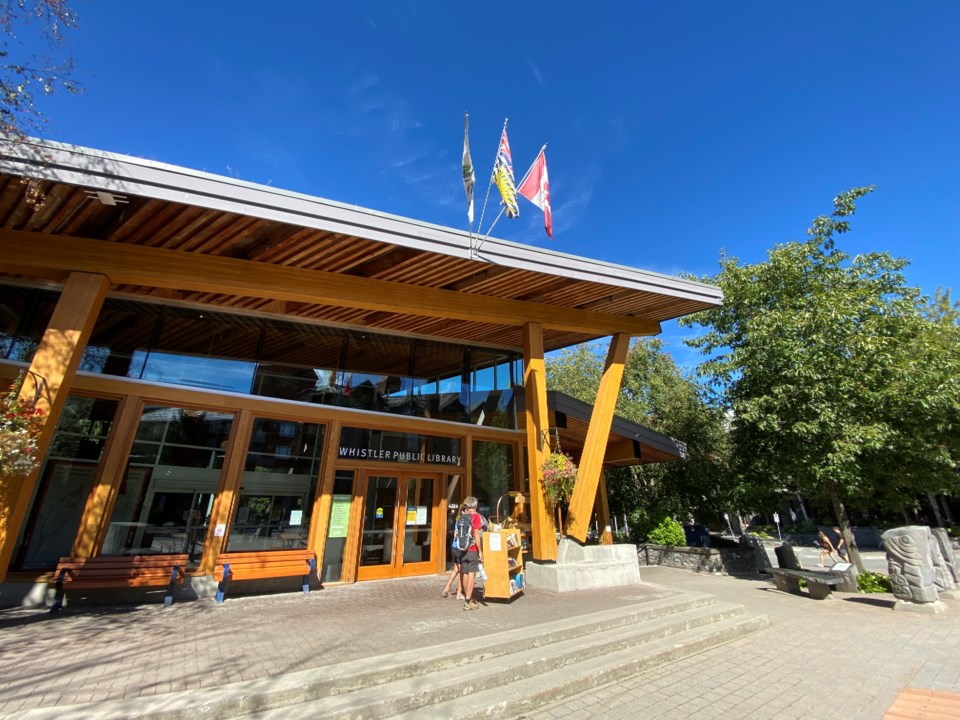The Whistler Public Library is on the cusp of beginning community engagement as it plots its strategic plan for the next few years.
Reporting on the state of the library at the March 19 committee of the whole meeting, library director Mikale Fenton said 2023 was a busy one.
Listing off achievements for the year, Fenton said the library opened its long-awaited Wonder Lab (a technology-oriented community space), while facility improvements included new small meeting rooms and the addition of book nooks, as well as a new sail on the patio—to say nothing of the numbers.
“Last summer we also achieved a personal record for our summer reading club attendance where we connected with over 1,700 patrons,” she said.
Higher numbers indicate more engagement: There were 156,000 in-person visits to the library in 2023, which was an increase of 38 per cent over 2022, and 2,525 new patrons registered.
The library collection increased by 4,238 physical items, while patrons borrowed 12,449 audiobooks and 17,694 picturebooks through the year.
“Of note, our highest-circulating item in 2023 was a Sphero Bolt, which is a coding robotic ball used to teach programming… followed by a ukulele,” said Fenton.
As for the strategic plan, Fenton said the library is operating off an 18-month bridging plan that will get it to mid-2024, which was designed to “get us where we need to be to look forward.
However, “2018 and 2024, it must be said, might as well be decades apart in how we think about understanding public space and the way the public uses libraries,” she added.
“The remote-work movement alone has had a tremendous impact on the way our patrons use our facility, and like our community, our library must also continue to adapt, evolve and change.”
The library is designing a community engagement plan and actively reaching out to stakeholders and community partners to determine what areas it needs to focus on as a major space in the community, using five categories: Livability; raising Whistler’s youth; reconciliation, EDI and access; lifelong learning and discovery; and community sustainability and resilience.
Each area was identified through a research report coupled with an “environmental scan” of Whistler community data, layered with library trends across the sector.
Fenton spoke to each area and how the library is considering them, but noted it is unable to tackle each alone.
“While the library doesn’t have the scope or the mandate to address every aspect of these challenges and opportunities, our hope is that by bringing them to light we can evaluate how the library’s strategic-plan process can create bridges and play a role in identifying and implementing solutions which do fall within our mandate,” she said.
The livability item encompassed the library as a physical, usable space for residents, as well as the needs of library staff in their experience working there.
“In our research and analysis, our key focus has landed on space and the importance of our physical space,” Fenton said. “As people increasingly live in densified housing, are working from home, perhaps while balancing at-home childcare due to a lack of daycare options or after school care, the importance of the library as a community living room is more important than ever as a place people feel they can belong and feel connected and be less isolated.”
Youth also feature prominently in strategic planning, with Fenton saying the library plays a vital role in supporting youth and families through youth programming and education.
The area covered most traditionally by a library’s mandate is lifelong learning and discovery—and Fenton said borrowing trends are continuing to change dramatically.
“Since 2019, ebook and audiobook use has increased by 20 to 30 per cent at the Whistler Library. Meanwhile, the cost for these items are significantly higher for a library to purchase than for the general public,” she said. “How should we plan our collection services and budgets to keep up with demand in a changing and complex new publishing climate? The pandemic taught us that reliable access to internet and a useable device is crucial to participate in society. It’s easy to take this for granted, yet how many people depend on the library specifically for this connection?”
She also noted the rise in social media and devices as having a polarizing effect on society, and talked about how a library can meet that challenge by shoring up its own processes to protect against misinformation, while also leaning into its role as a community space that breaks down walls and fosters connection.
The complete report to the committee of the whole can be watched on the RMOW website at whistler.ca/council.
Under the timeline proposed for the strategic plan, community engagement will open this month, library staff will analyze the data in May, a draft plan will be created in June, and the final version will be unveiled in September.




